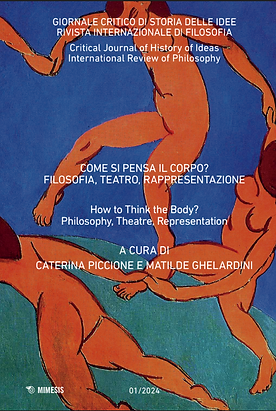N.1/2024 Come si pensa il corpo? Filosofia, teatro, rappresentazione
La scena del vero e del falso.
Lineamenti per una storia drammatica dell’idea di menzogna
Andrea Tagliapietra
Published in June, 2024
The Scene of the True and the False. Outlines for a dramatic History of the Idea of Falsehood.

Abstract
This essay is based on the fundamental thesis that reflecting on falsehood and truthfulness, that is, on the act of lying and the act of telling the truth,
means questioning not simply on truth, but on truth relations understood as
collective and individual practices.
Lying presupposes a splitting of the liar consisting, on the one hand, in
knowing the truth and, on the other, in the fiction that denies this same truth
through lying. Furthermore, the liar seeks to gain insight into the beliefs of
others by presenting himself in such a way as to enhance the effect of deception. In this doubling lies the dramaturgical and theatrical character of falsehood and the consequent oscillation between the viewpoint of the spectator
and the actor, between distancing and identification. This theatricality of
lying is analysed in its main philosophical stages through the history of ideas.
In ancient thought (Platon and Aristotle), lying is traced back to the paradigm of error and falsehood, that is, to the sphere of the intellect. In Roman
juridical thought and Christianity, culminating in the synthesis of Augustine
of Hippo, the horizon of the lie moves, on the other hand, to the level of will
and intention, preparing the paradigm shift that will take place in the modern age. For Descartes, in fact, unlike the Greeks, it is the false as error that
is a form of self-deception and, therefore, of lying. The analysis ends with an
exposition of Nietzsche’s view, which brings the idea of truth back into the
horizon of lie, highlighting, in polemic with the solipsism of the cogito, its
essential polyphonic and dramaturgical conception. From this perspective,
the Dionysian perfectly represents the theatrical, the absolute realm of lie,
fiction and conscious deception.
Keywords
Lie, Theatre, Dionysian, Spectator, Actor, Sincerity, Truth.
DOI
10.53129/gcsi_01-2024-08
